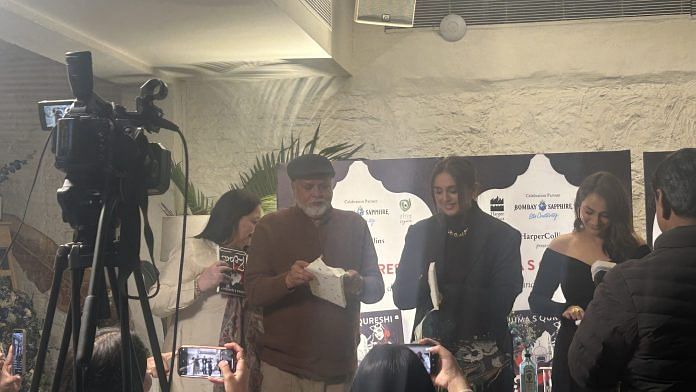New Delhi: Two weeks before the launch of her debut novel, Zeba: An Accidental Superhero, Bollywood actor and producer Huma Qureshi got cold feet.
“I [thought] I have to be the dumbest person to have ever lived. In an era where everything is clickbait, as an actress you say something and you get misquoted…I started picturing how people would think about me,” said Qureshi in conversation with comedian and actor Kusha Kapila at the Olive Bar & Kitchen in New Delhi on Friday.
The idea of writing a book took root during the pandemic when she started journaling every day. And the protagonist of her imagination, Zeba, soon became her muse—a young woman pitted against a villainous ruler in a fantasy world. The plotline may seem simplistic, but through Zeba, Qureshi address issues like PTSD, immigration, and women’s empowerment. The characterbecoming a superhero is accidental.
“I want to do a part like this, in a film or a series. Because nobody is writing it, I realised I’m going to wait for it or write it myself. That’s how it happened,” she said.
A woman’s superhero
Qureshi’s Zeba is unfazed by society’s strictures on women—a “badass” who does not censor her thoughts.
“I would really like to be Zeba. I am more emotional than her, and I think she is more badass than I am. She says things that come to her mind. As an actress I can’t do that,” said Qureshi.
Free from formality, the conversation between Kapila and Qureshi flowed like two friends catching up over coffee.
At one point Kapila asked the author if the book was about women’s empowerment. But Qureshi demurred. The term has become “so heavy over the years, we are often pressured by the burden of being perfect all the time.” Instead, she wanted her superhero to be human, a woman accepted for who she is.
“Why can’t we have a superhero who’s badly behaved, who’s sassy. We can be that—can we not?”
The conversation took a turn on being a woman today where everything is seen from the lens of gender. “I want to be a goddess, but my kind of goddess.”
Guests who had read the book expressed their appreciation for Qureshi’s Zeba and about ‘women writing women characters’. It’s more real, said one audience member Tehmeena Rizvi.
“I have seen that males only explain women through their imagination of how they would have been,” she said.
Toward the end of the discussion, Kapila noted that Qureshi was now an actor, producer and author, and asked what could be expected next from her. Qureshi responded with the lyrics of one of her songs: “Ye ek zindagi kaafi nahi hai.”
(Edited by Prashant)



